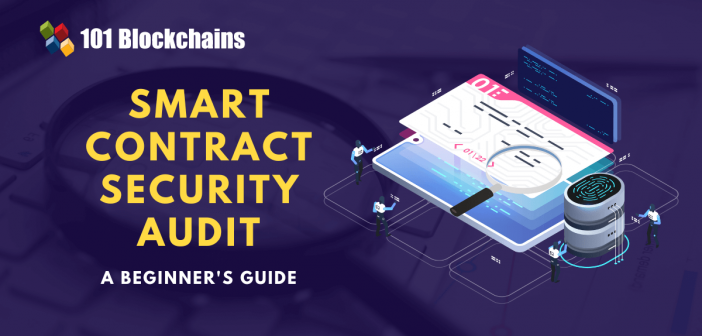Learn how blockchain truly works, master key definitions, and uncover what makes smart contracts so "smart." Dive into the fundamentals, gain valuable insights, and start your blockchain journey today!

Guides
Georgia Weston
on November 30, 2022
A Beginner’s Guide to Smart Contract Security Audit
- What is a Smart Contract Audit?
- Importance of Smart Contract Security Audits
- Methods for Performing Smart Contract Audits
- Types of Code Vulnerabilities
- Levels of Code Exploitation
- Steps in Smart Contract Audits
- What Are the Common Vulnerabilities Identified in Smart Contract Audits?
- Cost of Smart Contract Audits
- Bottom Line
Smart contracts are one of the prominent highlights in the domain of blockchain technology right now. They offer the foundation for building decentralized applications and could serve diverse industry segments with multiple applications and use cases. How does a smart contract security audit come into play in the rapidly expanding blockchain ecosystem? Smart contracts have been finding applications in different sectors, such as finance, supply chain management, digital assets, and the music industry.
The implementation of smart contracts on blockchain networks helps in achieving transparency into how they work. On the other hand, the transparency of smart contract code on blockchains could result in exposure to their vulnerabilities. As a result, hackers and malicious users could compromise smart contracts leading to loss and theft and customer data or revenue loss.
The consistently growing complexity of smart contract security issues calls for frequent audits of smart contracts. You must understand the working of security for smart contracts and the best practices for implementing security functions. The following post will help you understand smart contract audits and how they help in enhancing smart contract security.
Excited to learn about the critical vulnerabilities and security risks in smart contract development, Enroll now in the Smart Contracts Security Course!
What is a Smart Contract Audit?
The obvious highlight in an introduction to smart contract auditing focuses on its definition. Smart contracts serve as flexible instruments capable of tracing the movement of physical assets and intellectual property alongside facilitating and verifying financial transactions. Smart contracts take the responsibility of allocating high-value resources among complicated systems while working in a completely autonomous manner. Therefore, security and consistency are important requirements for ensuring the desired functionalities.
One of the notable entries among smart contract security best practices, the smart contract audit, is important for achieving formidable safeguards for smart contracts. Audits help in identifying the possibilities of security flaws in smart contracts and how they can affect smart contract operations. An audit could help in the detailed investigation of smart contracts for an application or project and safeguarding the related assets.
Any compromise in smart contract security would imply that users couldn’t recover their funds as transactions are irreversible on blockchain networks. Smart contract audits would emphasize the examination of code underlying the terms and conditions of smart contracts for faster identification of vulnerabilities. When you identify the vulnerabilities before deploying a smart contract, you can avoid the unwanted, expensive consequences of security breaches.
Curious to understand the complete smart contract development lifecycle? Enroll Now in the Smart Contracts Development Course!
Importance of Smart Contract Security Audits
The search for smart contract auditing tools clearly proves how smart contract security is a foremost priority for developers. Avoiding concerns regarding security, malicious behavior, and inefficiency during the creation and deployment of smart contracts can elevate the additional costs. For example, trivial flaws in smart contract code could lead to the loss of assets with significant value.
One of the recent instances of smart contract security flaws is the Ethereum DAO breach, resulting in losses amounting to $60 million. The most noticeable highlight of a smart contract is that it is irreversible and cannot be subject to change after deployment. In addition, security flaws can also result in the loss of the smart contract itself alongside the assets enclosed within.
You can learn about the importance of a smart contract security audit by reflecting on the following reasons –
- Early audits for smart contract code in the development lifecycle could help in avoiding the costs of potentially disruptive errors after deploying the smart contract.
- Smart contract security auditors double-check and verify the smart contract code manually to avoid any detrimental consequences.
- Security audits also provide the assurance of security for assets to all owners in the decentralized applications based on smart contracts.
- Comprehensive smart contract auditing can help in obtaining analytical reports with an executive summary, details of identified vulnerabilities, and mitigation strategy recommendations.
- Scripting and modifying code in accordance with smart contract audits could help in avoiding security threats directly through contract code.
- Smart contract audits can also facilitate ongoing security assessments for improving the development environment.
Want to understand more about the importance of smart contract audits? Check out Smart Contract Audit – A Detailed Guide Presentation now!
Methods for Performing Smart Contract Audits
The significance of smart contract audits creates interest in the methods for conducting audits on smart contracts. Smart contract audits facilitate the identification and verification of common vulnerabilities evident in the business logic of smart contracts. The concerns regarding smart contract security audit cost would point toward the selection of a method for the audit. You can rely on manual or automated approaches for smart contract audits, depending on your requirements and budget.
It is also important to note that smart contract audits also verify whether the smart contract code follows the Solidity Code Style Guide. In addition, the smart contract audit process also checks for logical or access control issues in the code. On top of it, you must also notice the difference in standards for smart contract audits between different projects.
Let us learn more about the two common approaches for smart contract security audits –
-
Manual Smart Contract Audits
Manual audits, as the name implies, require the efforts of professional auditors or experts to check each line of the smart contract code. The primary focus of manual audits is on the identification of re-entry and compilation issues. Manual audits can also help in the identification of crucial smart contract security issues, which are generally undermined, such as inefficient encryption practices. It is one of the comprehensive and accurate approaches for smart contract audits as it identifies not only design defects but also codes errors.
You can identify two distinct methods for manual smart contract code audits. Auditors could check the code manually and confirm the standard flaws evident in the code. On the other hand, developers could explore the code on their own according to their personal experience.
-
Automated Smart Contract Audits
The benefits of manual smart contract audit best practices could take a step back with concerns of human error. Therefore, automated smart contract audits can serve better results in identifying security flaws and vulnerabilities in smart contracts. Automated audits leverage bug detection software for rounding up on the exact source of errors.
You can use automated smart contract audits for projects where you need faster time-to-market as automation helps in faster identification of vulnerabilities. However, automated audits could experience troubles in understanding the context of the audit, thereby excluding certain vulnerabilities during the verification of code.
Excited to become a smart contract developer? Check out the detailed guide on How To Become A Smart Contract Developer now!
Types of Code Vulnerabilities
Smart contract audits focus on the identification of vulnerabilities in smart contract code. However, the variety of vulnerabilities for smart contract security is evident in classifications of flaws in the source code. Auditors can select suitable smart contract auditing tools for identifying how each category of flaws can affect the overall code. The classification of smart contract vulnerabilities on the basis of their potential impact and severity leads to four distinct categories. The four categories of code vulnerabilities are high, medium, low, and informational flaws. Each category has distinct consequences, such as,
- High-security flaws could impact a considerable number of users, along with prominent legal and financial troubles as consequences.
- Medium code flaws are generally associated with moderate financial impact while affecting the information of individual users. Such types of code flaws could also lead to potential legal repercussions for developers.
- Low-severity code flaws are related to minor risks or non-critical challenges for smart contract security.
- Informational code flaws are another notable addition to the categories of code flaws. This category includes flaws that don’t pose immediate risks, albeit proving their significance in recommended best practices for smart contract security.
Levels of Code Exploitation
Following the verification of code vulnerability variants, it is important to learn about the difficulty of exploiting the flaws. Smart contract security would follow three distinct levels of code exploitation such as high, medium, and low risks.
- A high level of code exploitation in a smart contract security audit focuses on defects that require access by privileged insiders into the system. It also involves the recognition of significant security problems before exploitation.
- Medium level of code exploitation turns the attention towards defects that require a comprehensive understanding of complex systems for exploitation.
- The low level of code exploitation emphasizes flaws that are frequently exploited. In addition, such flaws can be exploited with public tools or ensure automation of the exploitation process.
Steps in Smart Contract Audits
The definition of a smart contract audit and its significance offer a subtle hint at the best practices you must follow. However, smart contract auditing relies on a standard procedure, which could vary distinctively between smart contract auditors. Here is an outline of the notable steps you would find in a smart contract audit procedure.
-
Collection of Code Design Models
Before the deployment of third-party smart contracts, auditors would collect the code specifications of the smart contract. Auditors would evaluate the architecture of the code to identify the project goals and scope effectively.
-
Conduct Unit Tests
The second step in dealing with smart contract security issues through an audit involves unit tests. Auditors would check different cases to determine the functionality of smart contracts. Smart contract auditors could utilize manual and automated tools to guarantee the inclusion of the complete smart contract code in unit test cases.
-
Identify the Method of Audit
The selection between manual and automated smart contract audit methods could be quite confusing. However, manual audits have proved more successful than automated edits for the assessment of smart contracts. While automated audit software could miss the context of the audit and miss certain vulnerabilities, manual auditors check every line of code for vulnerabilities. In addition, manual auditing is helpful in detecting the probabilities of certain attacks, such as front-running.
-
Drafting the Initial Vulnerability Report
Upon successful completion of the audit process, auditors would document the details of code vulnerabilities in a report. In addition, the report would also feature recommendations by auditors for solving the issues identified in the audit. Interestingly, certain smart contract security audit service providers offer the assistance of experts for resolving every bug identified in the code.
-
Publication of the Final Audit Report
The final stage of the smart contract audit process is similar to the process of closing a project. Auditors can publish the final report only after resolving the code vulnerabilities. The final audit report would feature an outline of the actions implemented by the project team or external professionals to resolve the vulnerabilities.
What Are the Common Vulnerabilities Identified in Smart Contract Audits?
Smart contract audits could help you identify some of the standard vulnerabilities and avoid their detrimental consequences. Here are some of the common bugs you could find in smart contract code during an audit.
- Timestamp dependency
- Re-entry attacks
- The discrepancy in function visibility
- Typographical errors
- Randomization vulnerability
- Confusion between contracts and human agents
Cost of Smart Contract Audits
The most pressing question for smart contract developers would round up on the cost of the audit. The smart contract security audit cost could vary from $5000 to $15,000, depending on various factors, such as code complexity. On the other hand, the cost of the audit could increase by huge margins in certain cases. It is important to note that auditors have to check smart contract code line by line to identify vulnerabilities. Therefore, the complexities in the task and consumption of time make the audit services expensive.
On the other hand, the cost of smart contract auditing tools and the remuneration for auditors can help in avoiding the considerably higher costs resulting from the consequences of security vulnerabilities. The time and money invested in smart contract audits could offer value advantages of security after deploying the contracts.
Start your journey to becoming an expert in Web3 security skills with the guidance of industry experts through Web3 Security Expert Career Path
Bottom Line
The introductory guide to smart contract auditing emphasized its role in the future of blockchain and crypto. Most of the decentralized applications in the blockchain ecosystem use smart contracts for facilitating transactions. However, the transparency of smart contracts on a blockchain exposes their vulnerabilities to malicious agents.
Comprehensive smart contract audits could help in identifying the problems in smart contracts before they can cause trouble. Depending on your smart contract code and audit requirements, you can choose between manual and automated approaches. In addition, it is also important to follow the best practices for auditing smart contracts to ensure the best results. Learn more about smart contracts and the ideal solutions for safeguarding them now.
*Disclaimer: The article should not be taken as, and is not intended to provide any investment advice. Claims made in this article do not constitute investment advice and should not be taken as such. 101 Blockchains shall not be responsible for any loss sustained by any person who relies on this article. Do your own research!







